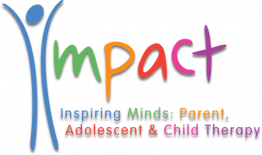
What is Psychotherapy and how can it help my child?
Parenting can be a tough job and sometimes it is difficult to know how to best help a child who is struggling. Often children and young people do not confide in their parents about their difficulties as they are worried about upsetting them. Sometimes children struggle with knowing what is wrong themselves and need someone outside of the family to help piece things together. Psychotherapists are trained to carefully listen and observe verbal and non-verbal communications from children and young people and then work alongside them to understand the difficulties and build resilience. This can be done through talking but also through creative mediums such as drawing, making or play.
What should I expect if my child begins to see a psychotherapist?
Before any work begins with a child, Impact North Psychotherapists will always come and speak with you first as we know you will have the best insight into your child’s behaviour, ways of coping, early history etc. We will then meet with the child, usually over 3 sessions, to see if psychotherapy will be useful to him / her and whether the child can make benefit of it. If all parties involved feel it would be useful then a period of work (usually 6 sessions) will be offered to the child shortly followed by a review (a meeting where parents and relevant professionals can attend). If further work is needed, another run of sessions will be offered and so on until the therapist, the child and the adults around him / her feel the work has been brought to a successful end.


Impact North psychotherapists will involve you in your child’s journey through therapy as much as possible. The sessions themselves will be confidential (so that your child builds trust and confidence in the therapist) but Impact North Psychotherapists will always feedback on over arching themes coming from the work and involve you, as the parent, in how to best support your child outside of the therapy setting.
It may also be the case that the therapist invites you to join the child’s sessions periodically or perhaps to your own sessions with the therapist. This is so that the adults can work together to best understand and support the child beyond the individual therapy sessions.
How can I get help for my child?
Schools, colleges and childrens centres are often the best place to start to look for help. This is because many staff in schools have a good understanding of children’s emotional and mental health and can point you in the direction of local support services.
MINDMATE is also a useful resource for support for children, young people & families
How can I help whilst my child waits for therapy?
Reliability, consistency and ‘firm but fair’ boundaries are the cornerstone of healthy childhood development. If you are struggling to carry out the above consistently you might want to approach your school to ask for a referral to a Family Support Worker who can work with you to help set boundaries, manage routines etc.
